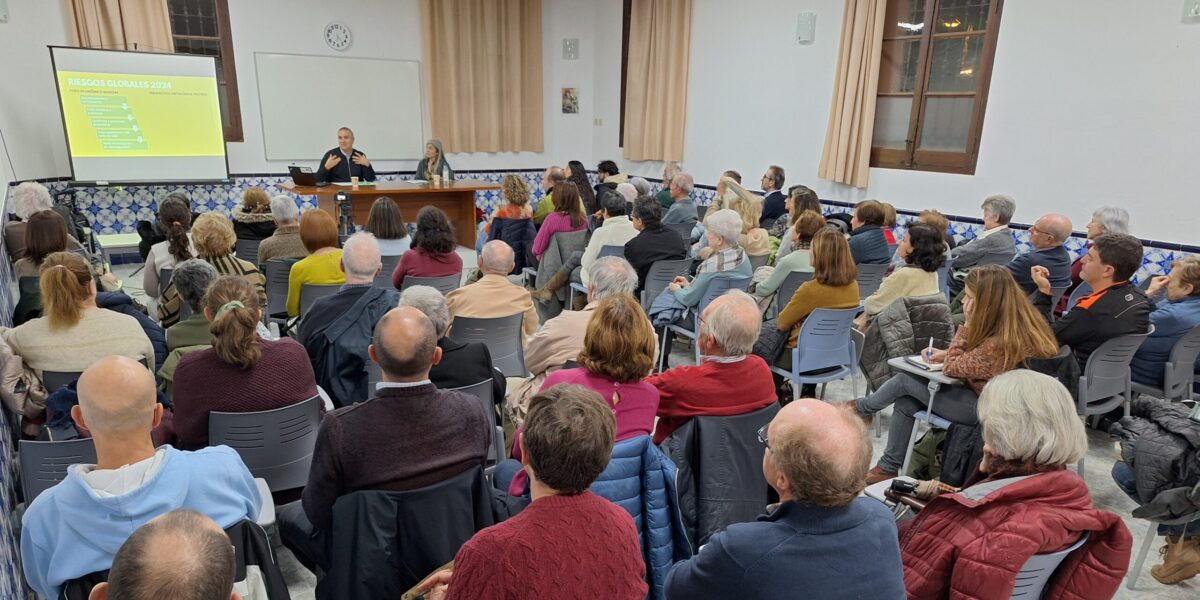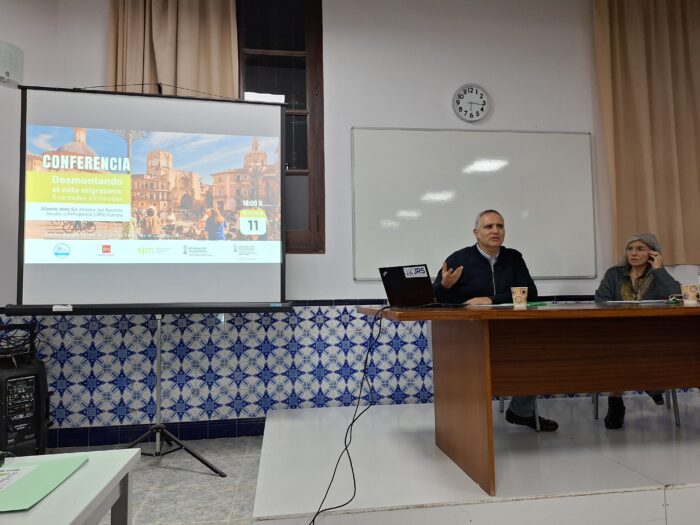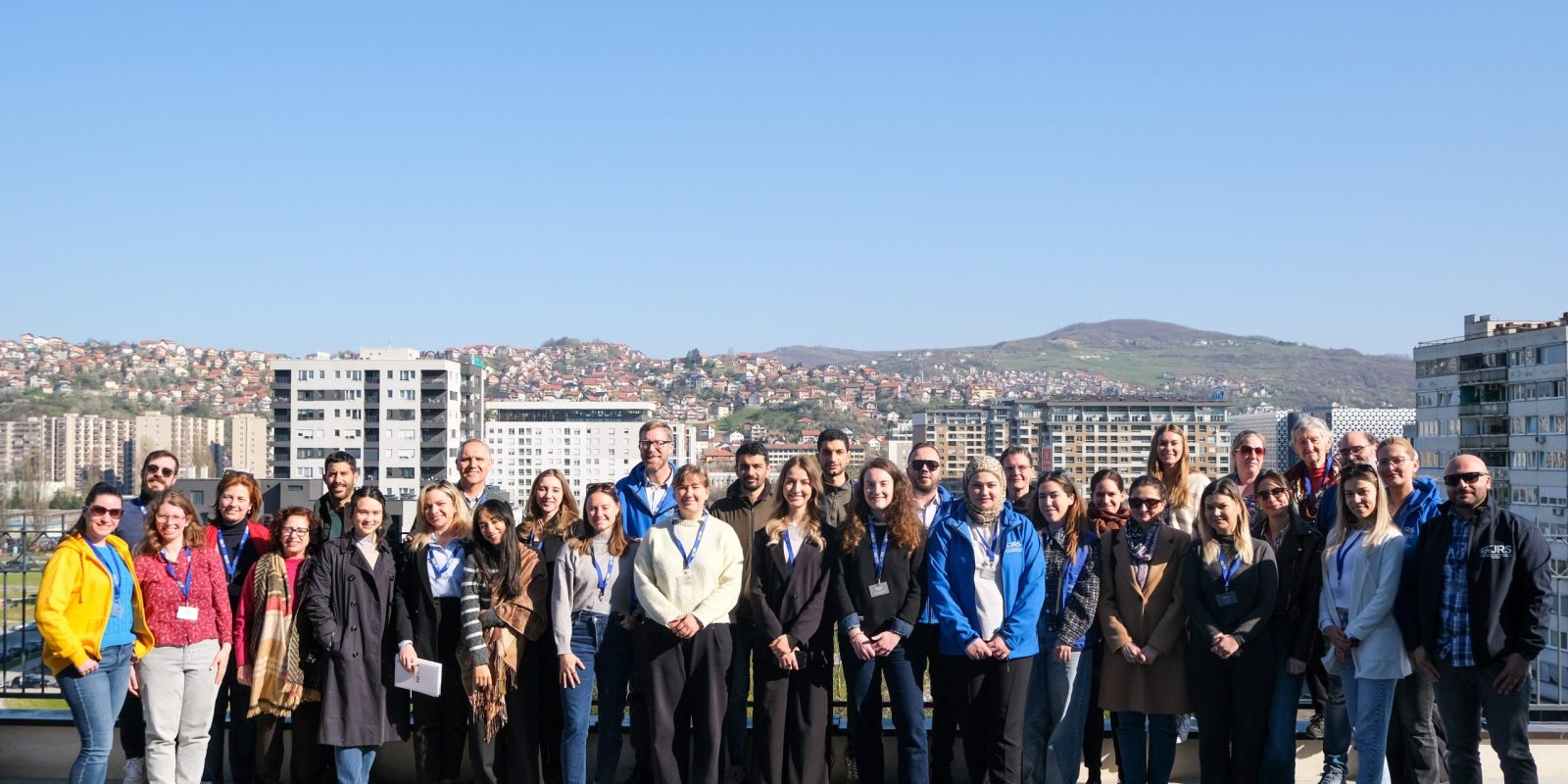Debunking 5 Migration Myths, a conference by Alberto Ares
18 December 2024|JRS Europe

In the context of International Migrants Day, JRS Europe Director, Alberto Ares, delivered a conference in Valencia titled “Debunking Migration Myths: Five Uncomfortable Truths.” Organised by the SJM Valencia, the event created a much-needed space to address misconceptions surrounding migration and its integration into society.
Exploring the Roots of Migration Myths
Where do migration myths come from, and why are people with migrant background often scapegoated for societal challenges? Alberto Ares traces these issues to historical shifts and global trends that have caused a “crisis of collective meaning,” fostering feelings of fear and isolation.
After World War II, humanity embraced values of solidarity, human rights, and the common good, giving birth to institutions like the United Nations and the European Union. Yet, in recent decades, rapid globalisation has led to fragmentation and growing inequality. These anxieties—whether about jobs, housing, or healthcare—are often unfairly blamed on migrants, oversimplifying complex social issues.
At JRS, we believe in tackling these misconceptions head-on, fostering understanding and promoting solidarity over division.
Five Myths About Migration
Let’s unpack five common myths about migration with facts and stories that show the reality:
-
“They’re Invading Us”
Migration levels have remained steady at around 3% of the global population. In Spain and Europe, irregular migration accounts for only 5-10% of all migration. Moreover, recent population growth in Spain owes much to migrants, who contribute significantly to the economy and support ageing societies.
-
“They Receive More Aid”
Migrants contribute more to the state than they receive in aid. For instance, a study in Murcia found that migrants contribute 70% more to the economy than they receive in benefits, outperforming native-born citizens by 30%. Between 2014 and 2018, migrants in the EU contributed an annual net of over €1,500 per capita—47 times more than native populations.
-
“They Cause More Crime”
Data refutes the notion that migration increases crime. In fact, some studies suggest that cities with high migration levels experience reduced crime rates. Spanish statistics show that native citizens commit more crimes in absolute terms. Furthermore, regularization enhances security by ensuring accountability and reducing exploitation.
-
“They Steal Our Jobs”
Migrants typically fill roles that complement rather than compete with local labour markets, often in essential sectors. In 2022, 9.93 million non-EU citizens were employed in the EU, comprising 5.1% of the workforce. However, they earn approximately 30% less than native workers.
-
“We Need More Walls”
The proliferation of border walls since 1990 has failed to curb migration and has instead resulted in human suffering. As Pope Francis aptly puts it, “All walls fall, whether today, tomorrow, or in a hundred years. Walls are not the solution. Build bridges, not walls.”
By breaking down these myths, we can create a society that sees migration as an opportunity for shared growth. A change in our framework of discussing migration is needed, because talking about migration is talking about ourselves, our own personal history and the development as a society. When facing these myths, we must have the courage not only to say the truth, but also defend the rights of the most vulnerable people in our society.
A Call to Build Hope Together
Amidst growing fear and division, Alberto Ares reminds us of the need to nurture hope, solidarity, and shared purpose. At its heart, the European Union was founded on values of justice, peace, and community. Returning to these roots means shaping policies that are humane, inclusive, and universal.
But it does not stop at policies—each of us has a role to play. As Ares puts it, “We must live as witnesses of hope, rooted in our values and passionate in our purpose.” By fostering understanding and solidarity, we can ensure that diversity strengthens, rather than divides, our societies.
The European Union serves as a poignant example. Its foundation was not merely economic or social but rooted in values of solidarity, peace, justice, and diversity. Reconnecting with these principles demands inclusive, universal, and human-centred policies that address critical issues like employment and housing.
On a personal level, this spirit of community invites us to rediscover meaning, strengthen social bonds, and craft narratives of hope. Living rooted means grounding ourselves in what gives life meaning, much like a tree nourished by its roots. Living passionately means cherishing the deep motivations that inspire us, akin to nurturing a cherished relationship.
In diverse societies facing demographic shifts, we have a choice: turn inward with fear and exclusion or embrace the opportunity to grow together. As Ares reminds us, the future of living together is a chance to thrive as a society.


